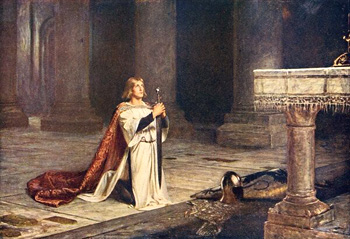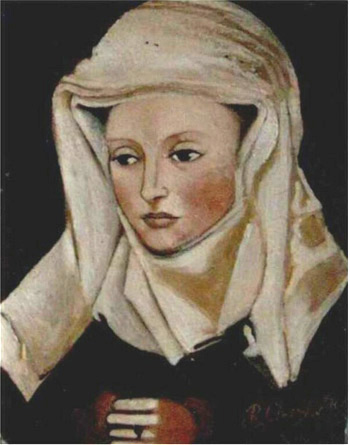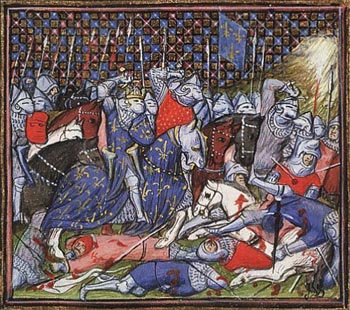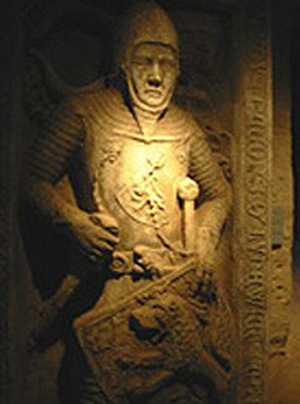Organic Society
 |
 |
 |
 |
 |
 |
 |
The Social Classes - IV
The Military Condition,
Soul of the Medieval Nobility
The vigil of arms on the night before being elevated to the knighthood is a good expression of the psychological balance of the medieval knight.
He spends the night in vigil at a church in complete silence; before him on a table in front of the altar are his sword, helmet, armor and spurs with which he will be invested the next day.
He is there praying alone, knowing that from the moment he becomes a knight his life ceases to belong to himself. With the oath he will take the coming morning he will be obliged always to offer his life for the defense of Holy Mother Church and to assist orphans, widows and all the weak and oppressed. He will be obliged before God to defend these people.
 What did the Church do when she inspired this ceremony? She did not hide from the knight the risks he would run. On the contrary, she created a time of vigil during which he could meditate on those dangers. The knight�s weapons placed before the altar showed him the reality of the combat he was meant to face. The helmet told him that his head could be split in two if he did not wear it; the iron protection for his neck reminded him that his throat could be cut; the armor signified that his chest could be pierced by a spear. All those arms showed him the imminence of the danger he would incur.
What did the Church do when she inspired this ceremony? She did not hide from the knight the risks he would run. On the contrary, she created a time of vigil during which he could meditate on those dangers. The knight�s weapons placed before the altar showed him the reality of the combat he was meant to face. The helmet told him that his head could be split in two if he did not wear it; the iron protection for his neck reminded him that his throat could be cut; the armor signified that his chest could be pierced by a spear. All those arms showed him the imminence of the danger he would incur.
The reasons for him to run those risks were also before him. They were reasons of a religious character: he knew that Our Lord Jesus Christ wanted him to consecrate himself to that mission. Then, for the love of Our Lady - of whom every knight was a servant and a herald - he made the decision to assume that difficult life.
The Knights Templar had a very beautiful custom: they slept semi-dressed for battle, always prepared to respond to a call to arms should the enemy appear. This act showed that even as they slept, they were ready for their mission and aware of its risks.
Therefore, the medieval knight voluntarily accepted the pain and the risk involved in the efforts of war. He accepted them as a cross to carry until the end of his life. He and all of his family participated profoundly in the trials and sufferings of war and combat.
How the family shared the knight�s mission
Indeed, when the knight went to war, his family prayed for him and was always awaiting news from him. No joy was greater than when a sentinel from atop the castle tower would announce that in the distance he had sited a group of knights bearing the family colors and that among the travelers he saw his Lord returning home.
 On the contrary, no sorrow was greater than learning that, instead of the Lord returning, it was his vassals either bearing his body or some of his belongings since his body had been laid in the hot sands of the Holy Land or the frigid waters of the Ocean.
On the contrary, no sorrow was greater than learning that, instead of the Lord returning, it was his vassals either bearing his body or some of his belongings since his body had been laid in the hot sands of the Holy Land or the frigid waters of the Ocean.
In either case, the family would pass months or years of agony awaiting news of him. The Lady of the castle would spend her time praying or weaving tapestries waiting for her husband and Lord to return home. The detailed work of those tapestries speaks of the long hours spent weaving them and the great resignation of those valiant Ladies.
Sacrifice, base for privileges
This notion of sacrifice and sorrow, along with the elevated reasons a man chose to run such high risks, gives us an idea of the high esteem enjoyed by the military vocation in the Middle Ages. That epoch had an entirely different idea of the military condition than what exists today.
At that time war was an occupation engaged in by only the military class. There was no obligatory military service, as exists in many countries today; there was no general mobilization of all citizens for a war, as also occurs today. When a country declares war today, it is common that all its citizens of a certain age and physical condition are conscripted. At that time those called to fight were restricted to a small number of persons.
General mobilization in effect did not exist by a tacit accord among the Christian peoples. When a war would break out, only the military class would be called to fight. The bourgeois class continued to eat, drink and sleep as normal, carrying out its functions in the habitual comfort of its daily life.
 Thus, the class that bore the whole weight of war should receive some advantages: it should be a privileged class. It was legitimate that this small group of the population - which had to offer its blood and bear the full weight of combat - should have more rights. This conception of combat gave rise to the honor and respect that medieval man had for the military.
Thus, the class that bore the whole weight of war should receive some advantages: it should be a privileged class. It was legitimate that this small group of the population - which had to offer its blood and bear the full weight of combat - should have more rights. This conception of combat gave rise to the honor and respect that medieval man had for the military.
Today the military lives from his salary, which - according to what some military friends tell me - is not very high. At that time, medieval man rewarded the military man by honoring him more than the bourgeois.
The military man normally was a noble, and as such he received from the King a significant section of land in the countryside, which he protected, cultivated and lived from in times of peace. Simultaneously, he used this time to train himself and his knights and squires for combat. As proprietor of a large estate, he was its Feudal Lord, which normally gave him a position of importance.
If a military man who was not a noble performed a heroic deed, this would catch the attention of the King, who normally would raise him to be a member of the nobility. Also, if a noble distinguished himself by glorious accomplishments, the King could raise him to a higher rank or grant him new honors. When this occurred, the King would gift him with more lands so he could provide properly for the protection and needs of the whole area in this new situation. This social system would encourage the nobles to excel in combat and in the government of their lands.
 The scale of values in that epoch was first, the glory and honor of the clergy, and then military glory and honor. This would encourage plebeian youth to enlist as volunteers in the troops of the local lords with the hope that, by performing heroic actions, they could rise to the nobility.
The scale of values in that epoch was first, the glory and honor of the clergy, and then military glory and honor. This would encourage plebeian youth to enlist as volunteers in the troops of the local lords with the hope that, by performing heroic actions, they could rise to the nobility.
The military spirit was deeply engrained in the noble families, whose members were habitually formed and raised with it. From their early childhood the boys were trained for the military life. Through the generations, this mentality was passed on and became part of a tradition by which families inherited a military temperament. This explains why, even to our days, we can still find a military spirit that has persisted in some families of the European nobility.
For example, we see it even today in the Junkers of Germany. The Junkers are the Prussian nobles who, since the Middle Ages, have dedicated themselves to military action. They are formed with such a strong military spirit that the best officers of Germany habitually come from this class. The Junkers exemplify well what a traditional formation means for the nobility.
Summarized and translated by the TIA desk from Cornelius a Lapide,
Commentaria in Scripturam Sacram, Paris: Ludovicum Vides, 1876, vol. 21, chap. 21
Posted October 8, 2011
He spends the night in vigil at a church in complete silence; before him on a table in front of the altar are his sword, helmet, armor and spurs with which he will be invested the next day.
He is there praying alone, knowing that from the moment he becomes a knight his life ceases to belong to himself. With the oath he will take the coming morning he will be obliged always to offer his life for the defense of Holy Mother Church and to assist orphans, widows and all the weak and oppressed. He will be obliged before God to defend these people.

A knight spent the night meditating on his mission and its risks
The reasons for him to run those risks were also before him. They were reasons of a religious character: he knew that Our Lord Jesus Christ wanted him to consecrate himself to that mission. Then, for the love of Our Lady - of whom every knight was a servant and a herald - he made the decision to assume that difficult life.
The Knights Templar had a very beautiful custom: they slept semi-dressed for battle, always prepared to respond to a call to arms should the enemy appear. This act showed that even as they slept, they were ready for their mission and aware of its risks.
Therefore, the medieval knight voluntarily accepted the pain and the risk involved in the efforts of war. He accepted them as a cross to carry until the end of his life. He and all of his family participated profoundly in the trials and sufferings of war and combat.
How the family shared the knight�s mission
Indeed, when the knight went to war, his family prayed for him and was always awaiting news from him. No joy was greater than when a sentinel from atop the castle tower would announce that in the distance he had sited a group of knights bearing the family colors and that among the travelers he saw his Lord returning home.

The Lady and the family shared the sufferings of their Lord when he was at war
In either case, the family would pass months or years of agony awaiting news of him. The Lady of the castle would spend her time praying or weaving tapestries waiting for her husband and Lord to return home. The detailed work of those tapestries speaks of the long hours spent weaving them and the great resignation of those valiant Ladies.
Sacrifice, base for privileges
This notion of sacrifice and sorrow, along with the elevated reasons a man chose to run such high risks, gives us an idea of the high esteem enjoyed by the military vocation in the Middle Ages. That epoch had an entirely different idea of the military condition than what exists today.
At that time war was an occupation engaged in by only the military class. There was no obligatory military service, as exists in many countries today; there was no general mobilization of all citizens for a war, as also occurs today. When a country declares war today, it is common that all its citizens of a certain age and physical condition are conscripted. At that time those called to fight were restricted to a small number of persons.
General mobilization in effect did not exist by a tacit accord among the Christian peoples. When a war would break out, only the military class would be called to fight. The bourgeois class continued to eat, drink and sleep as normal, carrying out its functions in the habitual comfort of its daily life.

Since knights were obliged to shed their blood for the common good, they were granted privileges
Today the military lives from his salary, which - according to what some military friends tell me - is not very high. At that time, medieval man rewarded the military man by honoring him more than the bourgeois.
The military man normally was a noble, and as such he received from the King a significant section of land in the countryside, which he protected, cultivated and lived from in times of peace. Simultaneously, he used this time to train himself and his knights and squires for combat. As proprietor of a large estate, he was its Feudal Lord, which normally gave him a position of importance.
If a military man who was not a noble performed a heroic deed, this would catch the attention of the King, who normally would raise him to be a member of the nobility. Also, if a noble distinguished himself by glorious accomplishments, the King could raise him to a higher rank or grant him new honors. When this occurred, the King would gift him with more lands so he could provide properly for the protection and needs of the whole area in this new situation. This social system would encourage the nobles to excel in combat and in the government of their lands.

The Junkers
The military spirit was deeply engrained in the noble families, whose members were habitually formed and raised with it. From their early childhood the boys were trained for the military life. Through the generations, this mentality was passed on and became part of a tradition by which families inherited a military temperament. This explains why, even to our days, we can still find a military spirit that has persisted in some families of the European nobility.
For example, we see it even today in the Junkers of Germany. The Junkers are the Prussian nobles who, since the Middle Ages, have dedicated themselves to military action. They are formed with such a strong military spirit that the best officers of Germany habitually come from this class. The Junkers exemplify well what a traditional formation means for the nobility.
- Footnote 1
- Footnote 2
- footnote 3
- Footnote 4
Summarized and translated by the TIA desk from Cornelius a Lapide,
Commentaria in Scripturam Sacram, Paris: Ludovicum Vides, 1876, vol. 21, chap. 21
Posted October 8, 2011
______________________
______________________








